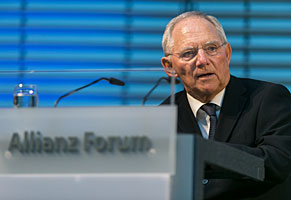Europe sharing a common army and a common budgetary policy? That sounds like an extremely futuristic vision of Europe when compared to what exists today. People have been calling for such a Europe to be created for a long time; the demands originated around the time of the Congress of Vienna, almost exactly 200 years ago. In his speech, "A union for the 21st century: How Europe can get itself into shape", Schäuble used this historical demand to highlight the fact that today we are still looking for the answer to the question, "What sort of Europe do we want?“
A strong Europe
Schäuble’s view is that we need a strong Europe, which focuses on the major issues. These major issues include ensuring a fair and open single market, regulating the financial markets, and securing a unified foreign and security policy. But strengthening Europe also means Europe being more frugal with its money in order to maintain trust. In Germany this is called "growth-friendly consolidation", allowing economic conditions to improve and budget deficits to be reduced.
If politics was going to work on a European level, agreements would have to be put into practice more effectively, says Schäuble, and adds, "It’s not the regulations that are the problem in Europe, but rather the fact that, all too often, not enough people adhere to them.” But for this to happen, the confederation would have to have a strong executive legitimized by the citizens of Europe, which is lacking at present. Regarding the necessary consolidation, Schäuble has a “Budget Commissioner for Europe” in mind, "who could reject the national budget if it doesn't comply with the commonly agreed regulations." This does not constitute any impingement on the sovereignty of the nation, because it would of course still be left to the Member States to decide how they ensure that these regulations are adhered to.
Italian Prime Minister Renzi has made a very promising step in the right direction for Italy. According to Schäuble, Renzi has drawn up an ambitious reform agenda for important structural reforms. Renzi presented this agenda to the public before the European Parliament elections, and as a result his party was voted in by the Italian citizens. That shows that citizens do want reforms to make sure that Europe continues being a strong community. If the structural reforms are going to succeed, a reliable budgetary policy in the sense of the Stability and Growth Pact is, according to Schäuble, absolutely essential.
More cooperation between Italy and Germany
It's not only Italy that needs an ambitious reform agenda, Allianz Board Member Oliver Bäte had explained before in his introductory speech. Bäte urged that "Germany can by no means afford to be complacent", but instead, the two countries can learn from one another and ought to work together. Bäte clarified his argument with various examples such as government debt, employment and unemployment rates, education policy and the World Bank's "Ease of Doing Business Index". The latter is an index which reveals how easy it is to do business in a particular country. Countries are assessed on factors such as how easy it is to launch a company, the tax system and the level of protection for investors. With an index ranking of 21 Germany only comes in at the top of the middle section, states Bäte in his speech, who goes on to argue that in this area there is major room for improvement.
Villa Vigoni:
The Villa Vigoni is an historical villa on the upper side of the Comer Sea. The society associated with it is known as a "German-Italian Centre for European excellence", and promotes German-Italian relations in science, education, culture, economy, society and politics. Former ambassador Michael H. Gerts is the German President of the Villa Vigoni Society. He hosted the proceedings of the Vigoni Lecture in Berlin.
